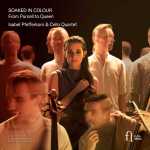
Composer: Robert Schumann
Performer: Leon McCawley
Format: FLAC (tracks)
Label: Somm
Release: 2014
Size: 1.06 GB
Recovery: +3%
Scan: yes
Faschingsschwank aus Wien, Op. 26
01. I. Allegro: Sehr lebhaft
02. II. Romanze
03. III. Scherzino
04. IV. Intermezzo
05. V. Finale
Kinderszenen, Op. 15
06. No. 1. Von fremden Landern und Menschen (Of Foreign Lands and People)
07. No. 2. Curiose Geschichte (A Strange Story)
08. No. 3. Hasche-Mann (Catch-as-catch-can)
09. No. 4. Bittendes Kind (Pleading Child)
10. No. 5. Gluckes genug (Happy Enough)
11. No. 6. Wichtige Begebenheit (An Important Event)
12. No. 7. Traumerei (Dreaming)
13. No. 8. Am Camin (By the Fire-side)
14. No. 9. Ritter vom Steckenpferd (Knight of the Hobby-horse)
15. No. 10. Fast zu ernst (Almost Too Serious)
16. No. 11. Furchtenmachen (Frightening)
17. No. 12. Kind im Einschlummern (Child Falling Asleep)
18. No. 13. Der Dichter spricht (The Poet Speaks)
Études symphoniques, Op. 13
19. Thema: Andante
20. Etude 1: Un poco piu vivo
21. Variation 3
22. Etude 2: Espressivo
23. Etude 3: Vivace
24. Etude 4
25. Etude 5: Scherzando
26. Variation 4
27. Etude 6: Agitato
28. Etude 7: Allegro molto
29. Variation 2
30. Variation 5
31. Etude 8: Sempre marcatissimo
32. Etude 9: Presto possibile
33. Variation 1
34. Etude 10: Sempre con energia
35. Etude 11: Con espressione
36. Etude 12: Finale: Allegro brillante
Recorded: 20-21 May 2012
Recording Venue: Champs Hill, Pulborough, West Sussex, England, United Kingdom
The wonderful Leon McCawley continues his exploration of 19th century repertoire for SOMM with the piano music of Robert Schumann, one of the greatest composers of the Romantic era. He begins with the delightful five-movement Faschingsschwank aus Wien, tender, stormy and passionate by turns, ending with a triumphant Finale, a real tour-de-force. He continues with Kinderszenen, one of Schumann’s most charming and imaginative creations written for his beloved Clara in 1838, and which, although simple to play, they are not pieces for children but poetic evocations of the child’s world, from a nostalgic adult perspective.
McCawley ends with the Études Symphoniques, one of Schumann’s most important and characteristic piano compositions. He wrote the Études in 1836 and dedicated them to William Sterndale Bennett who performed them widely. Schumann revised them in 1852 and at the request of Clara Schumann, they were further edited by Brahms in 1873 who restored the five variations which Schumann had inexplicably cut out. Leon McCawley, in a wholly complete performance here has chosen to play the twelve Études plus the five so-called ‘posthumous’ variations, placing them in an order in which, by instinct, feels it provides a welcome contrast between the dreamy, romantic Variations and the powerful virtuosity of some of the Études.



